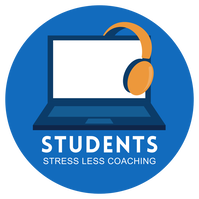Welcome to the blog
The Students Stress Less Coaching blog has a wealth of FREE resources, ranging in topics from executive function skills to exam prep. Enjoy.
|
Much content of this blog is from Attitude Magazine and Dr. Kevin Antshel, leading ADHD expert and psychologist/professor at Syracuse University. Kevin's bio will be posted at the end of this article. If you are not familiar with Additude Magazine on line, please check them out at: https://www.additudemag.com/webinar/college-students-with-adhd-outcomes-podcast-371/.Podcast 371: .com) As a professional stress management coach for college students, I work with a lot of students whose stress and anxiety are related to struggles accomplishing daily tasks. Many students can even identify exactly what areas of executive functioning cause them stress. By the time they come to me, they have maybe failed a class (or two), feel so behind academically that they want to drop out, or feel overwhelmed to the point of exhaustion. They want to be saved.
Creating habits, routines, and practicing the strategies needed to manage ADHD has to happen before arriving on campus; however, this becomes the beginning point for us in the coaching process. We look at where a student is with his skills to manage life, and we strengthen the ones needed on a daily basis to meet deadlines, establish routines, use environmental cues, create healthy consistent habits, and to manage stress. Most importantly, we work to shift that "can't do it" mindset to one of "I will work harder in different ways in order to feel on top of my life.". Let's start with some facts and then we will mention the Multi-Modal Approach that Dr. Antshel says is needed to be successful in college while managing ADHD. First, ADHD is a defined disability under the American with Disabilities Act. It is considered a brain disorder characterized by poor planning and organization, difficulty making decisions and paying attention, and difficulty regulating attention and emotions. The circuitry and neuronal pathways (and brain chemistry) of the prefrontal cortex in the frontal lobe of the brain are not connecting as other brains. This can make daily tasks in college (because of the fast pace) challenging. Procrastination, in particular, is "toxic" for college students with ADHD. Avoidance creates situations that are difficult to remedy. For these reasons, services, interventions, and support of several kinds are all needed in order for these college students to perform academically at the college level, reduce anxiety and stress, and to interpersonally connect with others and their environment. Secondly, one in nine college kids come to college with an ADHD diagnosis. Those who did not have practice exercising executive function skills in high school may find college to be difficult. This is when stress and anxiety mount. Anxiety and depression are both common co-occurring diagnoses with ADHD. https://www.additudemag.com/college-students-and-adhd-improving-outcomes/. Dr. Antshel and many other ADHD experts in the country support using a Multi-Modal Intervention Approach for college students as they transition from high school to college and while they navigate college each day. He says there are 5 resources that are all needed in order for a student with ADHD to feel successful: "College students know what to do, they just not DO what they know. Point of performance types of support like coaching are more effective for academic support of college students who have ADHD." 1. Office of Disabilities on campus - academic accommodations, and coaching services/strategies. 2. Counseling Center on campus - Cognitive Behavioral Therapy; psychosocial support; skills based groups 3. Student Health Center - medication management 4. Parents - information seeking help; keep communication; high support 5. Students - accountable for medication management (stimulant diversion is illegal), study strategies (not studying to absorb content). With these 5 kinds of intervention and support, college students with ADHD can achieve more than satisfactory academic success, manage mental and emotional health, and perform all daily tasks required of a college student. Resources: https://chadd.org/ - STAND - Supporting Teen Autonomy Daily model https://www.additudemag.com/ American with Disabilities Act American Pyschiatric Association (UNCG) - ACCESS - A CBT program https://www.learnpsychology.org/resources/adhd-in-college-students/ https://www.additudemag.com/college-students-with-adhd-risks-outcomes/ Kevin Antshel, Ph.D., is a Professor of Psychology in the College of Arts and Sciences at Syracuse University. He is also the Director of Clinical Training in the College of Arts and Sciences at Syracuse University. His research focuses on developmental psychopathology with specific emphasis on attention deficit / hyperactivity disorder (ADHD) across the lifespan.
0 Comments
Leave a Reply. |
|
